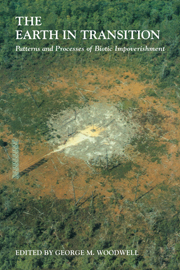Book contents
- Frontmatter
- Contents
- Preface
- Acknowledgments
- List of Contributors
- Part I Global Change and the Patterns of Impoverishment
- Part II Chronic Disturbance and Natural Ecosystems: Forests
- 8 The Restoration of Nonsuch Island as a Living Museum of Bermuda's Precolonial Terrestrial Biome
- 9 Patterns of Impoverishment in Natural Communities: Case History Studies in Forest Ecosystems – New Zealand
- 10 Changes in the Eucalypt Forests of Australia as a Result of Human Disturbance
- 11 Impoverishment in Pacific Island Forests
- 12 Deforestation in Brazilian Amazonia
- 13 Incentives for Sustainable Forest Management
- Part III Chronic Disturbance and Natural Ecosystems: Woodlands, Grasslands, and Tundra
- Part IV Chronic Disturbance and Natural Ecosystems: Aquatic and Emergent Ecosystems
- Part V Conclusion: Steps toward a World That Runs Itself
- Name Index
- Subject Index
11 - Impoverishment in Pacific Island Forests
Published online by Cambridge University Press: 24 November 2009
- Frontmatter
- Contents
- Preface
- Acknowledgments
- List of Contributors
- Part I Global Change and the Patterns of Impoverishment
- Part II Chronic Disturbance and Natural Ecosystems: Forests
- 8 The Restoration of Nonsuch Island as a Living Museum of Bermuda's Precolonial Terrestrial Biome
- 9 Patterns of Impoverishment in Natural Communities: Case History Studies in Forest Ecosystems – New Zealand
- 10 Changes in the Eucalypt Forests of Australia as a Result of Human Disturbance
- 11 Impoverishment in Pacific Island Forests
- 12 Deforestation in Brazilian Amazonia
- 13 Incentives for Sustainable Forest Management
- Part III Chronic Disturbance and Natural Ecosystems: Woodlands, Grasslands, and Tundra
- Part IV Chronic Disturbance and Natural Ecosystems: Aquatic and Emergent Ecosystems
- Part V Conclusion: Steps toward a World That Runs Itself
- Name Index
- Subject Index
Summary
Editor's Note: Islands have provided some of the most fundamental of insights into evolution and ecology while bearing some of the greatest burdens of human depredation. What biologist can remain long innocent of the saga of Darwin's finches as spun out by Darwin himself and David Lack and others who have been puzzled by the diversity of life of the Galapagos? Whose curiosity is not piqued by the biotic anomalies of New Zealand, Australia, Madagascar, Easter Island, Surtsey? And yet, while scholars have found extraordinary insights in the biota of islands, the biota was often devastated early in the period of human expansion through the introduction of goats or other ungulates thought to benefit seamen on future visits.
Both the puzzles and the depredations grow more complicated as human influences spread. Dieter Mueller-Dombois addresses the current transitions in the forests of Pacific Islands. He describes the rain forests of the Hawaiian Islands as “originally impoverished and secondarily enriched.” They were impoverished by comparison with other large islands of the Pacific that are closer to continental areas of higher diversity; they have been enriched by high endemism, a product of their insularity and period of isolation. Mueller-Dombois introduces a concept new in this treatment, progressive development through a peak period of a thousand years or more followed by regression as soils deteriorate.
- Type
- Chapter
- Information
- The Earth in TransitionPatterns and Processes of Biotic Impoverishment, pp. 199 - 210Publisher: Cambridge University PressPrint publication year: 1991



